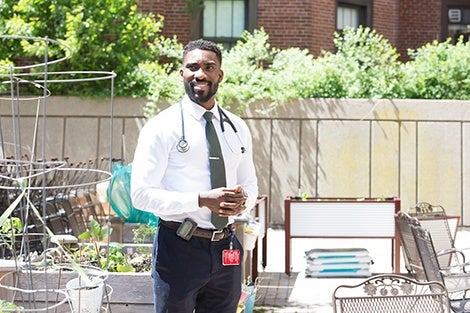Jamaji Nwanaji-Enwerem, PhD ’18, wants to use molecular tools to better understand how environmental pollutants harm health—and raise awareness about decreasing people’s risk
May 21, 2018—When he was growing up, Jamaji Nwanaji-Enwerem often traveled with his parents to visit relatives in Nigeria. Among the many striking contrasts between the country’s sprawling cities and the small North Carolina town where he’d lived since age one, were the waste-filled street gutters and the frequently hazy air. And many people seemed sick from living in this environment.
Those observations formed the basis for his desire to study the links between environmental pollution and health. This month, Nwanaji-Enwerem will earn a PhD from Harvard T.H. Chan School of Public Health and in two years, will receive an MD from Harvard Medical School. His research aims to help explain the molecular basis for air pollution’s damage to the body. He hopes to also heal those affected, and spread the message that unhealthy air doesn’t have to be accepted as the norm.
For his dissertation research, Nwanaji-Enwerem studied DNA methylation, a mechanism used by cells to control gene expression, the process by which the heritable information in a gene becomes functional. Because DNA methylation generally declines over time, it can be used as a marker of biological age. Previous studies have shown that some people’s DNA methylation age (DNAm-age) can be higher than their actual age, and that this is linked to an increased risk of premature death. Nwanaji-Enwerem wondered if exposure to air pollution might play a role in DNAm-age acceleration.
Drawing from the long-running Veterans’ Administration Normative Aging Study, he and his colleagues measured DNAm-age from blood samples and modeled the male subjects’ exposure to fine particulate air pollution (less than 2.5 micrometers in diameter) based on their addresses. They found a link between air pollution and accelerated DNAm-age, especially among men exposed to ammonia and sulfate particles.
From this work alone, Nwanaji-Enwerem published five peer-reviewed original research papers as first author, earned a grant from the National Institute on Aging, and received research awards from institutions including the International Society of Exposure Science. This year, he received a highly competitive Paul & Daisy Soros Fellowship for New Americans to support the completion of his degree at HMS.
As he resumes his medical studies, Nwanaji-Enwerem hopes to continue pursuing research in environmental health—and to find ways to work with policy makers to communicate what he’s learned to communities at risk from environmental pollution.
“In academia, we’re often focused on writing papers and grants and we can sometimes lose sight of the importance of making sure that the people who can most benefit from our work learn about what we’ve discovered,” he said.
Communicator, healer
Nwanaji-Enwerem got an early start as an environmental health communicator. Preparing for a sixth-grade speech competition on the topic “Soil and Water: Yours for Life,” he became distressed to learn that pollutants in the soil can be harmful to health. The message from his middle school speech still resonates with him today, he said: “The things we put into our soil, our water, and our air matter. Our environment is truly interconnected with our quality of life.”
Before he realized that he could make an impact through research, Nwanaji-Enwerem knew that he wanted to be a healer. His mother and grandmother are both nurses, and on trips to Nigeria, he would accompany them as they examined people living in their village. He remembers an elderly woman who lived near his grandmother and had a terrible cough. The woman blamed the cough on the dust, or malaria, and she and her neighbors accepted it as a normal part of life. Even then, Nwanaji-Enwerem felt that this wasn’t right. And with hindsight, he suspects that the smoky fires she and the other women cooked over may have been to blame.
In the face of Africa’s many urgent health challenges—such as infectious diseases like HIV/AIDS and malaria—other sources of suffering like this can often be overlooked, he said. But Nwanaji-Enwerem wants to address this gap, drawing inspiration from the World Health Organization Constitution quote that is etched on one of the School’s buildings. It reads: “The highest attainable standard of health is one of the fundamental rights of every human being.”
“I’m not sure what my legacy will ultimately be or if I as an individual can fully control that,” he said. “However, I do know that if my work helps improve health for people across the world—people from all backgrounds and all walks of life—I will feel like I have served humanity well.”
Photo: Sarah Sholes
